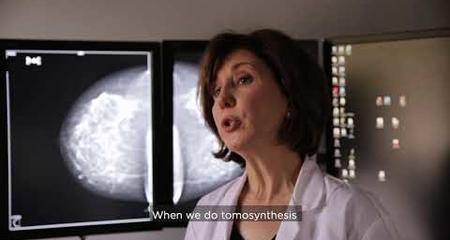The Breast Cancer Program includes a complete team of specialists in breast surgery, radiation oncology, medical oncology, reconstruction and follow-up care. These physicians work together to develop a comprehensive treatment plan for each patient.
Tumor Boards Develop Individualized Treatment
Our weekly "tumor board" meetings include surgeons, medical oncologists, radiation oncologists, pathologists, plastic and reconstructive surgeons and radiologists. This group formulates individualized treatment plans for all of our breast cancer patients.
We are committed to developing improved treatments for our patients and participate in several national clinical trials. The cornerstone to providing care to breast cancer patients is finding the best combination of surgery, medical therapy and radiation to optimize outcomes along with finding a plan that suits the needs of the patient.
Breast Cancer Treatment Process
Patients are given a tumor stage based on physical examination, radiology studies, and surgery results. Treatment is based on tumor size, lymph node involvement and the involvement of other organs as well as individual patient characteristics. Treatment may consist of receiving chemotherapy first followed by surgery or surgery first followed by either radiation, chemotherapy/hormonal therapy or both.
Surgical Options
Most women with breast cancer require surgery to remove the cancerous tissue. The highly experienced surgeons in the Breast Cancer Program are skilled in the techniques of breast-conserving therapy. Whenever possible, they offer surgical options that allow the patient to preserve her breasts while achieving long-term cancer control. In addition, various types of mastectomies can be offered to women who require or desire removal of the whole breast.
Radiation Oncology
Radiation therapy plays a key role in helping many women with breast cancer preserve their breasts. The Breast Cancer Program includes radiation oncologists who focus their practice on treating breast disease. They are national leaders in developing new methods of delivering therapeutic radiation and shortening treatment courses.
Medical Oncology
Various forms of drug therapy can decrease the chance of a breast cancer recurring and help fight cancers that have spread to other parts of the body. The medical oncologists in the Breast Cancer Program have an in-depth understanding of current options in chemotherapy, hormonal therapy and advanced biological drugs.
Lymphedema Care
Some women who receive treatment for breast cancer develop lymphedema, a swelling of the arm or hand caused by the accumulation of lymphatic fluid. Patients in the Breast Cancer Program have access to a board-certified physical medicine and rehabilitation physician and trained therapists who specialize in lymphedema care and rehabilitation for breast cancer survivors.
Mammograms and the COVID-19 Vaccine – What You Should Know
Swelling of the lymph nodes is a known side effect of the COVID-19 vaccine as well as other vaccines. Although it is temporary and not harmful, these enlarged lymph nodes may be seen on your mammogram. Because swollen lymph nodes can indicate breast cancer, we may call you back for additional evaluation and possible follow-up imaging.
Virtual Visits Are Available
Safe and convenient virtual visits by video let you get the care you need via a mobile device, tablet or computer wherever you are. We’ll gather your medical records for you and get our experts’ input so we can offer treatment options without an in-person visit. To schedule a virtual visit, call 1-866-680-0505.
More to Explore





